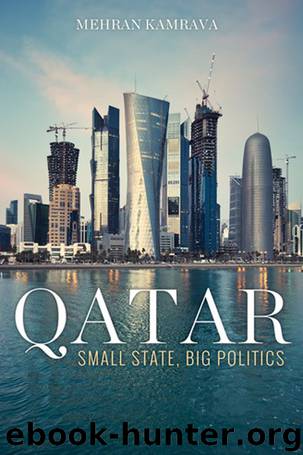Qatar: Small State, Big Politics by Mehran Kamrava

Author:Mehran Kamrava [Kamrava, Mehran]
Language: eng
Format: epub
ISBN: 9780801469336
Publisher: Cornell University Press
Published: 2013-06-27T04:00:00+00:00
Political Consolidation and State-Building
State institutions and social actors engage in multiple processes of negotiations, interactions, and resistance toward each other, and in the process they have significant constitutive and transformative consequences on one another.25 It is important to focus on the processes of interaction between state and society and how each transforms and influences the other through ongoing interactions. As Joel Migdal has convincingly demonstrated, while states transform societies in multiple ways, “the state is hemmed in—indeed transformed—by” a mélange of social forces within its territory, just as it is by international forces. Society’s structure affects politics at the highest levels of the state, just as it does the implementation of state policy at the lowest level. The structure of society can deny the state its ability to carry out its intended agendas in relation to particular social actors and groups. At multiple levels and in multiple arenas, states struggle to dominate society, at times with complete success while at other times only partially successful, and still at other times with no success at all.26 Rejecting “the false primacy of institutions,” Sangmpam similarly argues that “society-rooted politics determines institutions even if one recognizes the latter’s effect on politics in return.”27
This mutually transformative process of state-society interaction is most evident in efforts to construct a state and consolidate political rule in Qatar. State-building in Qatar took place under circumstances that are largely unique in relation to most other parts of the Arabian Peninsula. Unlike in Saudi Arabia, Kuwait, or Bahrain, Qatar’s ruling family did not have to contend with other groups in their vicinity who had collective identities or corporate interests. In Qatar, lack of easily accessible ports and an underdeveloped pearling industry resulted in the comparative weakness of the merchant class, and an absence of vibrant urban centers impeded the growth of a robust religious establishment. This left the large Al Thani clan as the only organized group to vie for power and freed it from the need to offer concessions to other, potentially competing groups. Political competition was thus limited to within the ruling family.
The flow of oil revenues further consolidated Al Thani rule, though it did little to foster cohesion and unity within the family. If anything, internal family competition over political power and influence intensified. The emir was not always successful in resisting demands of the family members for revenues accrued from oil sales. In 1952, British officials in the region reported that the Al Thanis received one-third of the proceeds from oil revenues, a sum that was raised to 45 percent of the total by 1958. At the same time, throughout the 1950s and 1960s, following the advice of the British to involve more family members in the state administration in order to “blunt the edge of the succession issue,” the emir gave more concessions to unhappy family members and allies and potential rivals alike, therefore deepening the Al Thanis’ hold over the various offices of the state.28
Only beginning in the 1990s, with the ascension to
Download
This site does not store any files on its server. We only index and link to content provided by other sites. Please contact the content providers to delete copyright contents if any and email us, we'll remove relevant links or contents immediately.
| Africa | Americas |
| Arctic & Antarctica | Asia |
| Australia & Oceania | Europe |
| Middle East | Russia |
| United States | World |
| Ancient Civilizations | Military |
| Historical Study & Educational Resources |
Empire of the Sikhs by Patwant Singh(23078)
The Wind in My Hair by Masih Alinejad(5092)
Rise and Kill First by Ronen Bergman(4781)
The Templars by Dan Jones(4685)
The Rape of Nanking by Iris Chang(4206)
12 Strong by Doug Stanton(3542)
Blood and Sand by Alex Von Tunzelmann(3199)
Babylon's Ark by Lawrence Anthony(2674)
The History of Jihad: From Muhammad to ISIS by Spencer Robert(2622)
No Room for Small Dreams by Shimon Peres(2367)
The Turkish Psychedelic Explosion by Daniel Spicer(2355)
Inside the Middle East by Avi Melamed(2352)
Gideon's Spies: The Secret History of the Mossad by Gordon Thomas(2346)
Arabs by Eugene Rogan(2293)
The First Muslim The Story of Muhammad by Lesley Hazleton(2268)
Come, Tell Me How You Live by Mallowan Agatha Christie(2257)
Bus on Jaffa Road by Mike Kelly(2151)
Kabul 1841-42: Battle Story by Edmund Yorke(2025)
1453 by Roger Crowley(2024)
